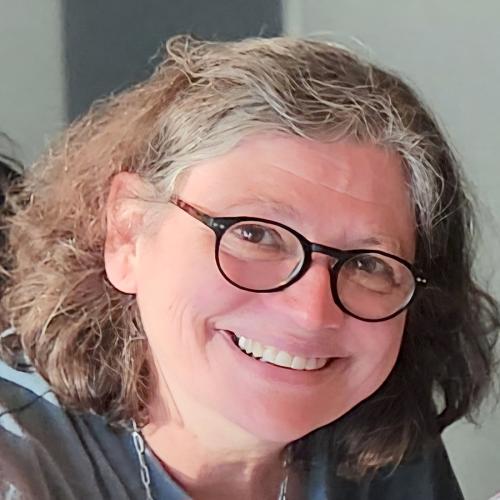Associate Professor Carol Tilley has been studying comics since she was just a child, when she could be found each Saturday morning at her local drug store perusing the week’s new titles. She couldn’t have predicted then that she would become one of the nation’s leading experts and a popular speaker on comics.
A former high school librarian, Tilley has researched comics readership and the role of comics in libraries and education, both today and historically. Her initial research interest was born from the fact that the public library, where she did most of her reading, didn’t include comic books in its collection.
“When I became a school librarian, I realized how strange it was growing up that I had to go to two different places to get the stuff I wanted to read. When I went back into the doctoral program I was still thinking about those issues and what the division was. I started trying to learn more about how we got to that place,” she said.
Tilley’s research has focused on comics/youth engagement—historically and today—and the many factors that have influenced engagement, such as the role of librarians and educators. She has looked closely at the attitudes and practices of librarians, which may have impacted comics readership and certainly influenced access, as Tilley knows from her own experience.
On the road to understanding the relationship between comics readers and librarians, Tilley has studied an array of related topics: from youth engagement through comics during the medium’s heyday in the 1930s and 1940s, to the causes and effects of comics censorship beginning in the mid-1950s, and to the resurgence of readership today and ways that librarians can harness this revived popularity to engage with modern young readers.
“It’s really just been in the last five to ten years that there’s been this big groundswell of change. You see most school and public libraries collecting comics now,” Tilley explained. “[We’re] beginning to reclaim children’s voices and what it means to be a child who reads or did read comics….For me, it’s just trying to understand all of that trajectory, and it’s tied in with our notions of kids and reading and what’s appropriate, their literacy development and social, moral, and ethical development. It’s tied in with censorship and intellectual freedom issues, with who we are as a profession and our professional values, and a whole host of other things.”
In her recent Journal of Research on Youth Services in Libraries article, “Comics: A Once-Missed Opportunity,” she presents examples of young people using comics as an avenue for engagement in participatory culture, such as fanzines—magazines produced by fans—and political discourse. Tilley uses several examples of historical engagement to call on today’s librarians to think critically and creatively about ways to encourage youth engagement through media and technology. She’s also looked at how comics publishers worked to encourage reading and ways that comics were used in language arts classrooms.
A forthcoming volume on print culture and protest, to be published by the University of Wisconsin Press, will include a chapter by Tilley on the response of young comics readers to criticism from adults in the 1950s. She also will publish chapters on the origins of the educational study of comics in two forthcoming Routledge handbooks.
Tilley is working with GSLIS Associate Professor Kathryn La Barre and colleague John Walsh at Indiana University to create a scholarly digital portal that will document comics readership historically. The team will assemble a collection of documents such as fan letters, contest entries, and autobiographical resources that will be available to support researchers in the digital humanities and social sciences.
 “There’s no good or comprehensive documentation of comics readership over the last seventy-five years,” Tilley explained. “This will be an opportunity to take lots of disparate pieces and put them in one place where we can begin to look at demographics, interests, and trends over time.”
“There’s no good or comprehensive documentation of comics readership over the last seventy-five years,” Tilley explained. “This will be an opportunity to take lots of disparate pieces and put them in one place where we can begin to look at demographics, interests, and trends over time.”
In addition to her scholarly success, the growing popularity of comics has made Tilley’s work especially relevant to comic book creators, librarians, and the reading masses. One of her articles—“Seducing the Innocent: Fredric Wertham and the Falsifications that Helped Condemn Comics,” published in Information and Culture: A Journal of History—was highlighted in The New York Times and quickly caught the attention of comics fans, bloggers, and historians.
A snowball of national attention opened doors for her to speak at venues such as Comic-Con International: San Diego, Wizard World Chicago, and New York Comic Con. Her work has even been featured in two documentaries, “Carol Tilley: Comic Book Crusader” and “Diagram for Delinquents.” With “Seducing the Innocent” reprinted and illustrated as the cover story in a recent issue of Alter Ego and a another documentary film feature in the works, Tilley’s research is poised to reach an even broader audience.
"It's been a pleasure to give an increasing number of talks at comics conventions (cons) the past couple of years," said Tilley. "At cons, I'm as likely to engage with professional librarians and comics fans as I am with comics scholars, creators, and publishers. It leads to rich conversations, new ideas for my research, meaningful engagement with the profession, and scores of great anecdotes and examples for teaching."
Recently, Tilley spoke to scholars and readers at several invited talks in celebration of Banned Books Week. The 2014 celebration of banned and challenged books featured comics and graphic novels specifically, presenting opportunities for supporters to champion comics reading in the face of historical challenges to the medium’s sometimes violent and risqué content. Tilley presented "When Comics Almost Died: Readers, Censors, and Innovation" at Brookline (Massachusetts) Public Library and at the Carol Spaziani Intellectual Freedom Festival at the Iowa City (Iowa) Public Library, the latter of which included a special screening of "Diagram for Delinquents," and "The Secret History of Comics Censorship" at the Urbana Free Library. She also spoke virtually with students at San Jose State University’s School of Information.
Bringing the history of comics to light sets the stage for comics to return the higher reading levels enjoyed decades ago and for increased scholarly appreciation. “For a lot of us culturally we’ve been told that comics are juvenile and stupid and semi-literate, and so I think that just making them an object of research is validating. I have a lot of librarians, parents, [and] readers who talk to me, and they’re just appreciative that someone is doing work like this,” Tilley said.
In its first podcast of New York Comic Con interviews, Publishers Weekly speaks with Carol Tilley about her research on Fredric Wertham.


